Jillian’s Stage 3 Metastatic Synovial Sarcoma Story
Jillian shares her stage 3 sarcoma story, synovial sarcoma subtype, and undergoing a tumor resection surgery. She would discover metastasis to her right lung and undergo an open thoracotomy.
In her story below, Jillian also highlights life after a cancer diagnosis, from the support that helped most, finding her cancer community, and the impact on her relationship. Thanks for sharing your story, Jillian!
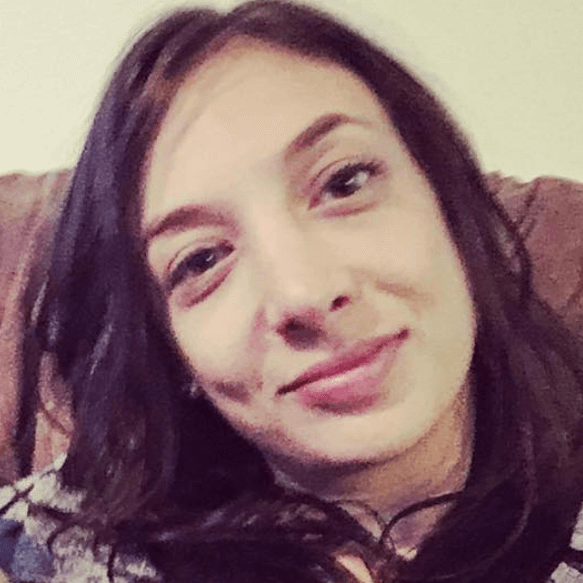
- Name: Jillian J.
- Diagnosis:
- Synovial sarcoma
- Type of soft tissue sarcoma
- Age at DX: 31
- Staging:
- 3
- Metastasis later
- 1st Symptoms: Worsening pain in leg
- Treatment:
- Surgery
I realized I needed to learn how to live with this. I spent the next year trying to learn how to accept things as they were.
Jillian J.
This interview has been edited for clarity. This is not medical advice. Please consult with your healthcare provider for treatment decisions.
Diagnosis
What were the first symptoms?
It goes all the way back to high school. I was around 16 or so. I was goofing off at work with a friend. I got punched in my leg. I had a massive bruise in that spot. I was an active teenager, and of course, I didn’t ice it or anything like that.
Over the years, I noticed I had some sensitive nerve pain in that spot. It was just in this tiny area where I was hit. I went 10 years protecting it.
Five years before my diagnosis, I had a bunch of stuff going on. My boyfriend at the time picked me up by my legs and squeezed me, just saying hi when he got home.
I remember him squeezing me, and there was an excruciating amount of pain in that spot on my leg. It came and went quickly, but it was so incredibly painful for that short time.
The pain changed after that. It would start throbbing and get worse. I started going to the doctor and got a bunch of different diagnoses. I got one doctor who said I needed to dump my boyfriend. Another doctor told me I needed antidepressants. I wasn’t depressed. I was just in pain.
I felt really defeated about it for a long time. Fast forward five years. I lived in the mountains in California. I had a huge week of hiking and snowboarding. I landed one jump wrong, and when I got home, I had a huge lump in that spot on my leg.
About a month later, my cat jumped over me, and he jumped right on my leg. That nerve pain didn’t go away. I was screaming in bed and asked my roommate to take me to the ER.

What happened at the ER?
They took an X-ray, and they diagnosed me with a calcium deposit. Even though I had this big lump, all that came up in the scan was a tiny spot of what they thought was calcium.
Between a few doctors over the course of a few weeks, I got an MRI. From that point, everything happened really fast.
Describe the core needle biopsy
I had a core needle biopsy next. It’s a needle about the size of a coffee stirrer. It was miserable. My leg was so sensitive.
I went into a procedure room. It was guided by ultrasound. They put some gel on me and found it with the ultrasound. I laid flat on my side. The needle is very loud. It cuts and sucks the sample out. They got two samples and called it quits because it was so painful for me.
I don’t know if everyone experiences pain. I think mine was just because the tumor was so sensitive.
Scan and biopsy results
My MRI had suggested it might be cancerous, but I was just oblivious at this point. I was so healthy and happy at this point.
I just didn’t think there was any way it could be something like that. I was sticking with the calcium deposit diagnosis.
I got the biopsy on a Friday. On Monday, I got a call saying I needed to come in. At the office, the doctor said, ‘It’s cancer. This is sarcoma.’
How did you process the diagnosis?
I’ll never forget that day. I walked in as the best version of myself. I walked in as someone I was happy to be.
It was scary realizing that this pain I’d had for half of my life was cancer. I wasn’t familiar with sarcoma either, so that was scary. I thought I was going to lose my leg or die.
The last thing that happened before he left the room was I asked him, “Why did this happen to me?” He just said it was bad luck.
I took really good care of myself and still do. I just didn’t understand how this happened. My health was the most important thing to me. I prided myself on not being sick.
»MORE: Processing a cancer diagnosis
Breaking the news to family and friends
I told my dad, and then eventually the whole family knew. I got so many calls from people wondering what was going on. I fit my whole life into my car and drove cross country from California to New York, where my family was.
Memorial Sloan Kettering is one of the best sarcoma centers in the world, so I went there. Moving was definitely the hardest part. It’s hard enough to deal with cancer, and then you add the stress of that on top. It was a lot.
»MORE: Breaking the news of a diagnosis to loved ones
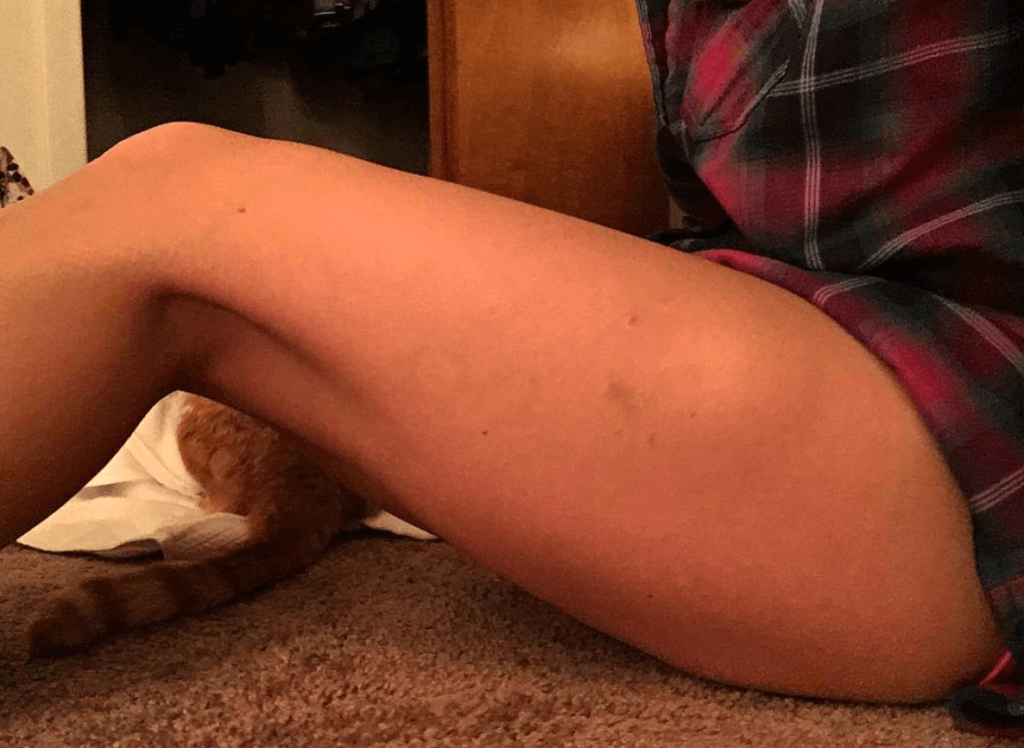
Tumor Resection Surgery
What was your meeting with your oncologist like?
Everything was pretty straightforward at MSK. I had my first appointment and got my tumor removed in the same week.
Pathology actually dated my tumor at five years old.
That would’ve put it around the time my boyfriend had picked me up.
CT scan to determine metastasis
That first day, I went to get a CT to see if my cancer had spread to my lungs. That’s where synovial sarcoma likes to spread to. Fortunately, it hadn’t.
Control of treatment decisions
My parents have always been a little controlling. I kind of felt like my choices were taken away from me.
I felt like a pediatric patient and like I had to do what I was told. I was terrified, but I wasn’t allowed to be scared. It just was what it was. I had to do it.
I also didn’t like that my surgeon at Sloan didn’t acknowledge my leg injury or the pain I’d had for 15 years. He said, “That’s a funny coincidence.” Surgeons can have that God complex, so I understand, but it was scary. Later, my oncologist in Colorado validated my feelings on that, though.
What did you do before the surgery?
I took the weekend and went to Pennsylvania to see high school friends. We went on a seven-mile hike. It was so cool. I just wanted to use my body as best as I could because I didn’t know what was going to happen to my leg. I was scared of losing my leg. At the very least, losing some function.
I didn’t know who I was going to be when I woke up. That was the scariest part.

Diagnosis and staging after surgery
It was confirmed that I had synovial sarcoma by the time I got to Sloan. After surgery, he came out and said it definitely was synovial. It was stage 3.
He said they got it all out with clean margins. I was able to put weight on it and walk out of the hospital about two days after the surgery. I was declared NED (no evidence of disease) before leaving the hospital.
Luckily, no major nerves or bones were involved. I got a picture of the tumor. I wanted to see what was in my body that wanted me dead. The most haunting part of it for me was that they took some of my skin with it.
Recovering from surgery
When I woke up, though, it was the first time in 15 years I woke up without pain of some kind. I was ecstatic. Not that it was cancer, but I was so happy the pain was gone.
Then the healing took a while. I recovered on my own. A quick eight-week recovery wound up taking months. I had my drain for three months, and then they had to replace it. I had a water balloon basically where the tumor had been.
I had the area aspirated a few times. Luckily, I found some homeopathic stuff that worked to absorb the fluid. I used staphysagria (plant) to absorb the fluid, and it worked in a matter of days.
»MORE: Read more patient experiences with surgery
Describe the physical therapy
Physical therapy was heaven for me. I loved being busy and seeing the progress. I just wanted to get strong again. It was a year to the day just about that I was able to run again. My skin healed great. I have a little hip displacement from the muscles that were removed. I’m just so happy I have my leg because so many people with my disease aren’t so lucky.
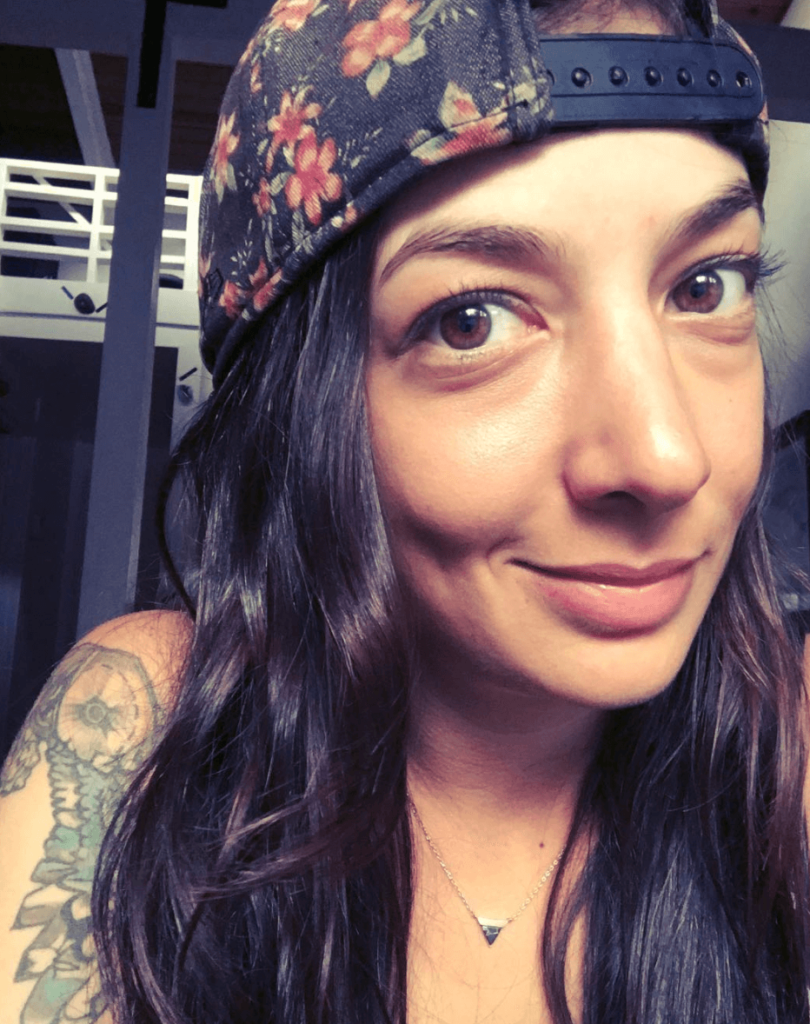
Open Thoracotomy (Surgery)
Cancer in the lungs
At my two-year scan, I found out I had metastasis in my lungs. They were mostly in my right lung, and I had one in my left. That was the scan that would’ve graduated me to six-month scans if it had been clean.
Wait and watch
We just decided to wait and watch. I have concerns about chemo and radiation. I don’t want to lose the health I still have. Aside from this cancer, I don’t have anything else going on.
We decided we would just scan again in two months. Then we monitored every three months. A year later, I got a scan. Everything had grown pretty significantly.
Surgery to remove the cancer
I had to have an open thoracotomy. They cut you from under the shoulder blades and unfold your chest basically. It was either that or chemo. My oncologist said the surgery was a better option long-term.
I left the hospital with a new plan. I got all kinds of tests. I had a pulmonary test, an EKG, and all that stuff. I met with the surgeon a few days later. In between the scan and the surgery wasn’t a long time.
Preparing for the surgery
Being brave isn’t about how you feel; it’s about what you do, so I just had to go and be brave.
I knew I was going to have to get a chest tube and a drain when I woke up. I was nervous about that, but I had to just do it.
Describe the thoracotomy
I recommend anyone who’s getting a thoracotomy to get the epidural. Absolutely do it. You read about things and get other people’s perspectives, but you just have to do it for yourself.
Surgery was super quick. It only lasted about 2.5 hours. I asked a bunch of questions beforehand, but I really liked my surgeon. I felt ready enough.
When I woke up, my drain was bleeding a lot. I was scared, but I just let them take care of me. Other than that, recovery wasn’t too bad with epidural.
At one point, it fell out. My pain management got it back in. From that time on, it was smooth sailing. I was in the hospital for about four days. I moved around a lot, and I took a lot of cannabis there.
I didn’t want to take the narcotic pain meds they gave me. I took Aleve for pain because it was great for the bone pain in my ribs. I used a lot of cannabis oil and patches as well. I took the oxy a couple of times, only if I had to.
How was recovery from the surgery?
Recovery at home took weeks and weeks. I couldn’t wear a shirt, really, for a long time. If I did wear a shirt, it had to be a button down because I couldn’t lift my arm.
I took 6 weeks off of work, and at 4.5 weeks in, I was still miserable. I got a free acupuncture session right around the time I was able to get a big T-shirt on.
The acupuncturist put these little seeds in my ears. You can leave them for three days. They press on your ears and stimulate your pain-relieving signals in your brain. I went weekly and had that done. I also nebulized at home, and that helped a lot, too. Moving around and getting some massage work done made a huge difference.
Reflections
Can you talk about your support system?
Unfortunately, I didn’t get the support I really needed and wanted from my family. Once it became something that wasn’t going to be life-threatening, they just stopped calling.
They said they would be there, but I don’t know. It just wasn’t a big deal for them. No one really brought food or came to visit me. I had a lot of resentment for a long time. I still do actually. It was so toxic.
Eventually, I lost myself in New York. I wanted to go back to doing the things I loved. My best friend was in Colorado. She opened up her home to me. I felt comfortable going to a sarcoma specialist in Denver.
Moving here just seemed like a good idea. It was scary changing my care, but I’m glad I did. At a smaller facility, I didn’t feel like a number anymore. MSK was so big and busy all the time. I just felt safe for the first time in a long time.
I saved up and got my own apartment here. I met my boyfriend around the time my mets were discovered. I put it all out on the table from day one. I told him I needed support and for him to be strong and if he couldn’t do that, then he needed to walk away. He’s been great, though. It didn’t scare him away.
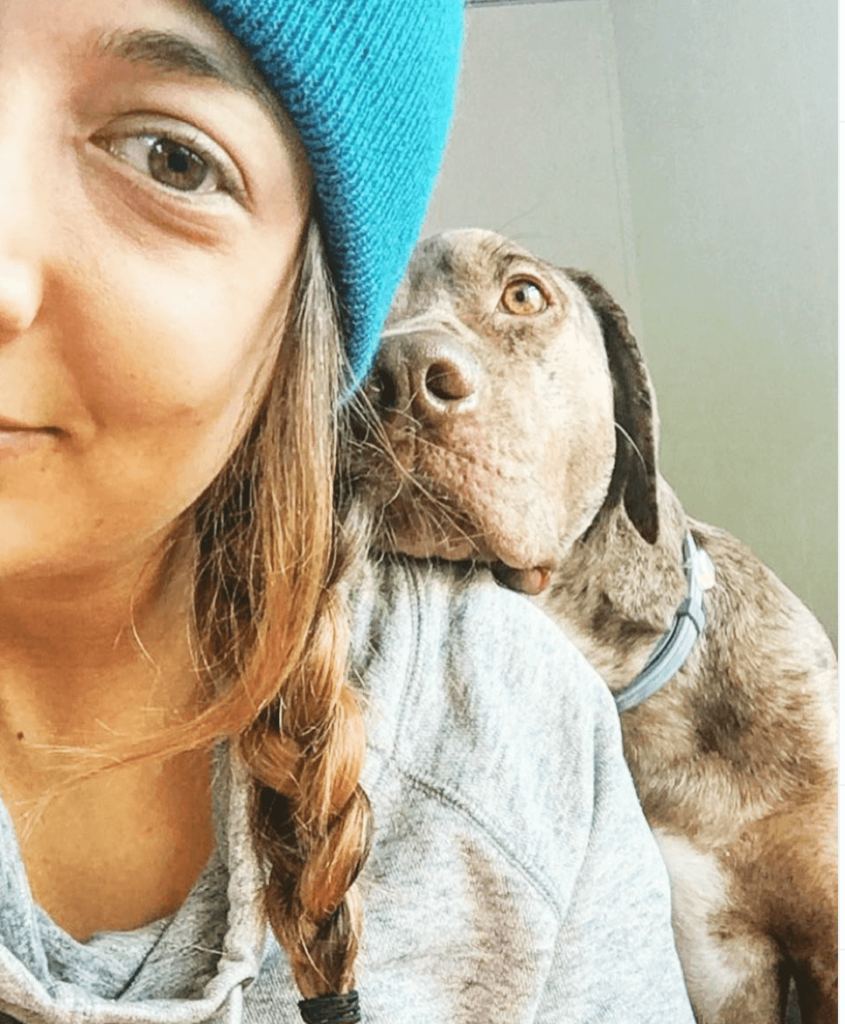
Finding your cancer community
I started opening up about it on social media. I put a few posts out there. It was scary, but at the same time, it was crazy the people who stepped up for me. I would definitely say you need to talk about it because you can’t do it alone. The support has been awesome.
I went from feeling pretty worthless for three years to feeling like I have people wanting me to succeed.
How does the cancer impact your relationship with your boyfriend?
I think it all scares him quite a bit. After my thoracotomy, he was scared to touch me, but I wish he had just crawled into my bed and held me a lot more than he did. We’ve talked about that, and we’re getting through that.
He wants to hear the news first. He’s my partner and my teammate. I’ve always been a private, closed-off person, but I try really hard to share my feelings with him and open up about things I’m scared of.
It’s hard to love someone else while you’re going through your own trauma. I wish I could be better to and for him, but he’s so supportive. He helps me with everything.
I do wish that he would let me do something if I tell him I can do it. I don’t like feeling weak, but I know he’s just trying to help.
It’s really nice having someone at the beginning and end of the day. I couldn’t imagine doing this without a partner. He internalizes a lot, and I have to make sure he talks to me about his feelings, too, because he can get overwhelmed.
We’ve been together for a little over a year now. Over time, things have gotten better. Taking space when I’m at my worst is really important because I don’t ever want to take things out on him. We have to work on always communicating because it’s never good to keep your feelings inside.
»MORE: 3 Things To Remember If Your Spouse/Partner Is Diagnosed With Cancer
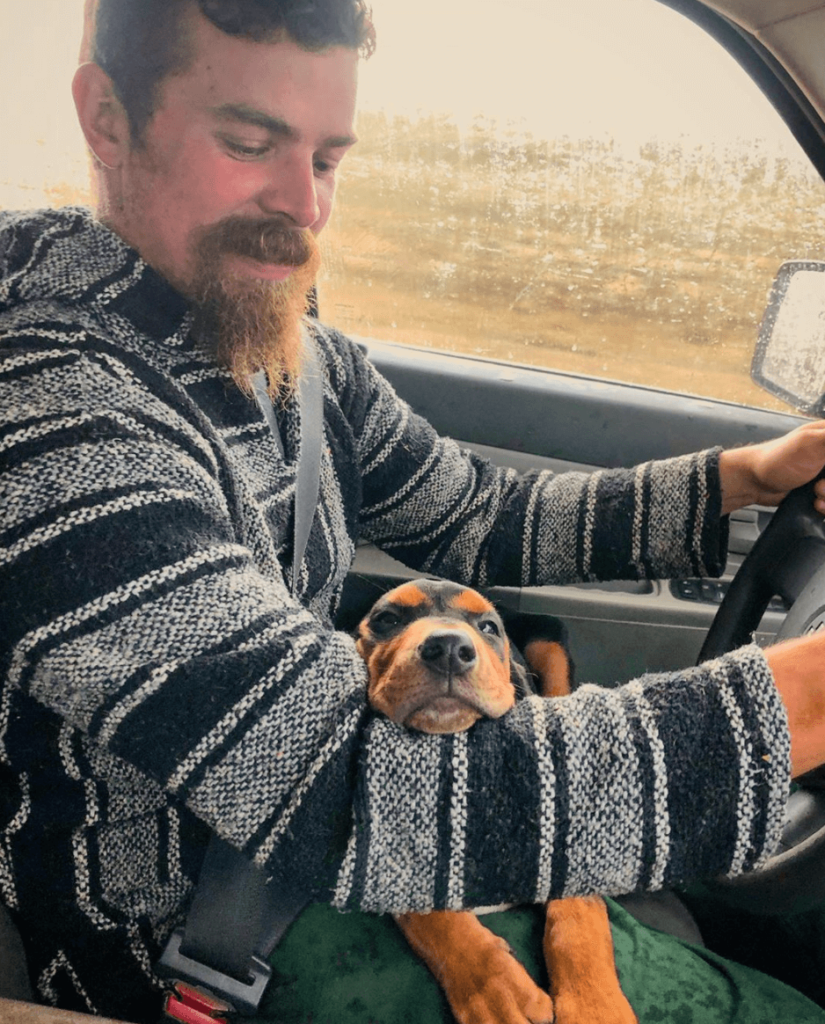
How has cancer changed your perspective on life?
For the first two years, I was in denial. I wanted so badly to go back to my old life. I lived in fear for two years because I was so worried about it coming back. Then, two years later, it did metastasize.
I was like, ‘Well, I worried about this. I wasted two years worrying about this, and now here it is anyway.’
I realized I needed to learn how to live with this. I spent the next year trying to learn how to accept things as they were.
Once the surgery happened, I decided the old me is dead. I knew I needed to learn how to be happy now. I couldn’t keep wasting my life in fear. I decided to start living. This hasn’t been living for me.
I lived every day to the fullest before cancer. Then I sat on my butt for three years. I try to go out and do things now. I’m kinder to people now, too. Just because some pain seems harder than others, it doesn’t matter.
We all go through shit. No one who goes through something is special for it. We all go through different things. I’m kinder now because I never know what people are going through.
What’s your message for someone who has just been diagnosed?
When you’re diagnosed, that’s the worst of it. The initial diagnosis is so traumatic. All the unknowns and everything being so new is so hard.
It will get better. It could get worse, but I don’t think it gets worse than the initial diagnosis. It will get better.
Some people say not to go on the internet, but Facebook groups were life changing for me. It was great to get advice from people who have gone through the same things.
Don’t be scared to get a second opinion. Advocate for yourself. Our healthcare system is so incredibly flawed, so fight for yourself. It is literally designed for people to get stuck and fall in the cracks.
Advocate, advocate, advocate.
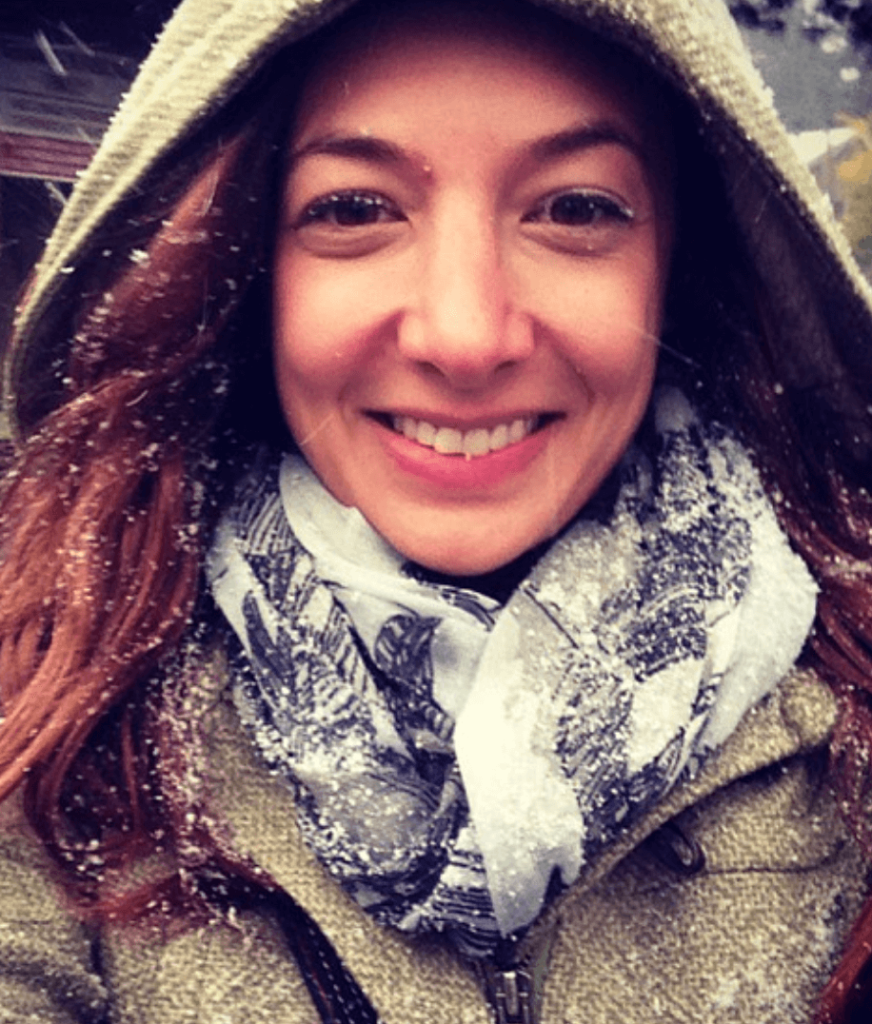
Inspired by Jillian's story?
Share your story, too!
Synovial Sarcoma Stories
Kara L., Synovial Sarcoma, Stage 1B
Symptoms: Pain behind left knee, needle-like sensation in left foot
Treatments: Surgery to remove what was thought to be benign tumor, chemotherapy, final surgery, radiation (36 sessions)
...
Jillian J., Synovial Sarcoma, Stage 3
Symptom: Pain in leg for over 15 years
Treatments: Surgeries (tumor resection, thoracotomy)
...
Marisa C., Synovial Sarcoma, Stage 4
Symptom: Small bump on the foot (stable for years, then grew during pregnancy), pain when pressed
Treatments: Surgeries (below-knee amputation, pulmonary wedge resections, segmentectomy), chemotherapy, radiation (lungs & hip)
...
Julie K., High-Grade Poorly Differentiated Spindle Cell Synovial Sarcoma, Stage 4
Symptoms: Chest and back pain after car accident, trouble breathing
Treatments: Chemotherapy, surgeries (lung resection, video-assisted thoracoscopic surgery or VATS, neurectomy, rib removal), radiation therapy (CyberKnife)
...
McKenna A., Synovial Sarcoma, Stage 3 Grade 3B
Symptoms: Insomnia, weak immune system resulting in persistent illnesses such as UTIs and strep throat, severe swelling in left leg
Treatments: Surgery (tumor excision), chemotherapy, radiation therapy (proton radiation), integrative therapies
...
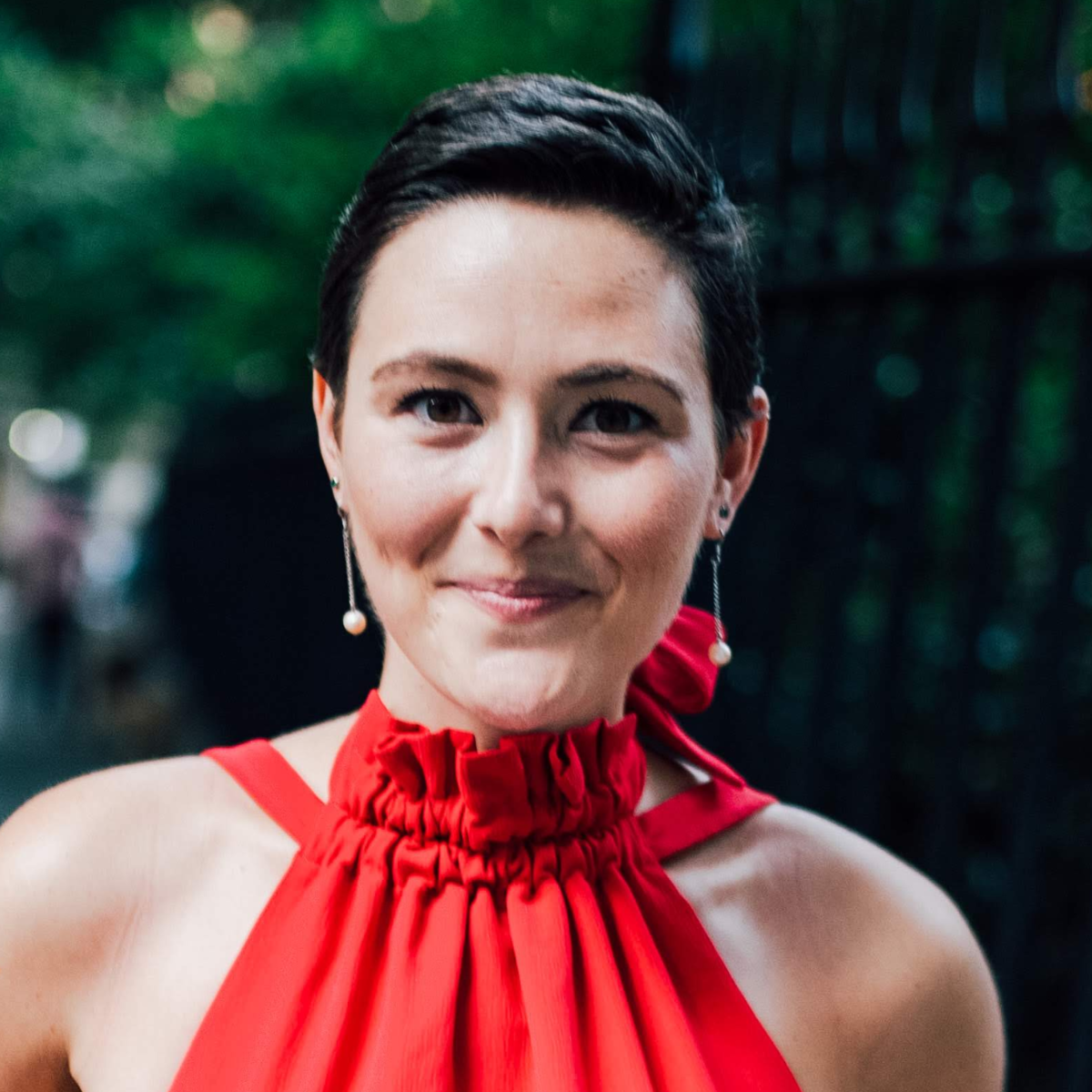
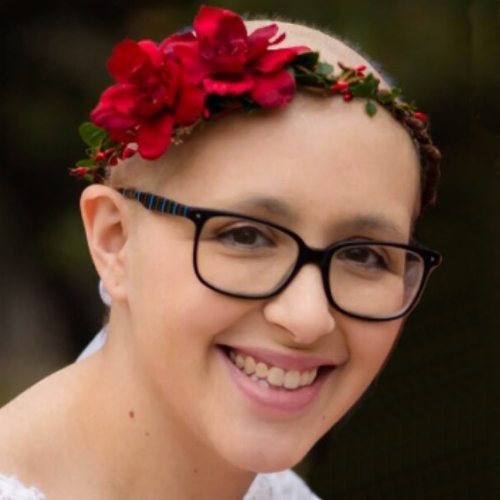
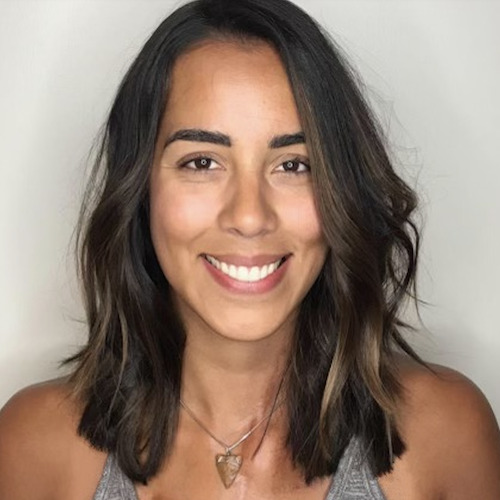
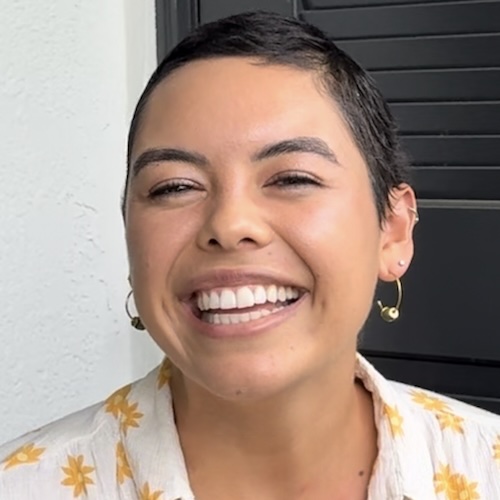
2 replies on “Jillian’s Stage 3 Metastatic Synovial Sarcoma Story”
Jillian I am so touched by your story. My daughter has been diagnosed with Synovial Sarcoma stage 4. She is only 18 with just 2 credits left to graduate and now it’s like she was living in a snow globe and cancer just shook it all up. She says she was gaslit by the Dr’s. that told her the lump in her leg was nothing to worry about and said it was spasms caused by her plantar fasciitis and even sent her to physical therapy! It just makes me sick because maybe we could have caught it sooner. Currently She is doing “Red Devil chemo, targeted therapy, radiation to shrink the tumor than surgery. Problem is the tumor is wrapped around her vein and compressing her femoral nerve. It has also metastasized there is a nodule in her lung. For her to have surgery mayo has also called a vascular surgeon. And a plastic surgeon to reconstruct the leg. She doesn’t care about the risk She just wants it removed I know she will be helped by your story so much because we love her and are with her every step of the way but Noone can really understand how she’s feeling better than someone that has dealt with it and beat it. She has even changed her major to nursing specializing in oncology because of the love and support from her oncology nurses at Phoenix Children’s.
Great writing Jillian! You are so honest about yourself and your emotions. Very brave. Excellent writer, too. You could be a professional writer. And you should try and sell this story to a media outlet (I’m old enough to remember when magazines were paper and they paid good money for great articles). Stay well!